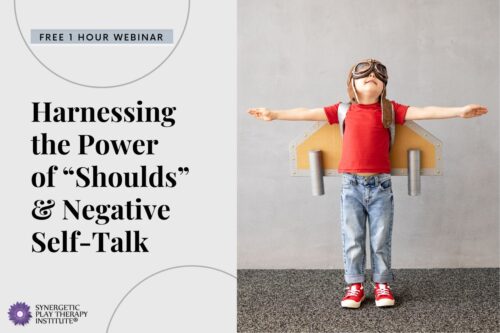-

 As a graduate of the Synergetic Play Therapy Certification program, you now have access to the SPT Certified Community, a one-stop-shop for resources, important updates, and a community of other Certified Synergetic Play Therapists and Certified Synergetic Play Providers looking to connect with YOU! So what is the SPT Certified Community Membership? This Membership is an opportunity for MORE! More engagement, more opportunities to connect and build relationships, More support, and More content to deepen your learning! By signing up for the SPT Certified Community Membership you are gaining access to exclusive content:
As a graduate of the Synergetic Play Therapy Certification program, you now have access to the SPT Certified Community, a one-stop-shop for resources, important updates, and a community of other Certified Synergetic Play Therapists and Certified Synergetic Play Providers looking to connect with YOU! So what is the SPT Certified Community Membership? This Membership is an opportunity for MORE! More engagement, more opportunities to connect and build relationships, More support, and More content to deepen your learning! By signing up for the SPT Certified Community Membership you are gaining access to exclusive content:- Monthly LIVE Webinars with Lisa and Special Guest Teachers
- Monthly SPT Connect Opportunities
- Yoga + Mindfulness Classes
- Access to the full Webinar Library with 70 webinars and counting
- Access to Bonus Video Content
- Surprise discounts on the SPTI courses and trainings
- Continued personal and professional transformation
 As a graduate of the Synergetic Play Therapy® Certification program, you now have access to the SPT Certified Community, which will serve as the place for you to keep up with important announcements, upcoming events, and information related specifically to you - a Certified Synergetic Play Therapist or Certified Synergetic Play Provider. This online gathering place is our gift to you as a thank you for choosing to be a part of the SPT Certified Community! We are so grateful to have such an expansive community and hope the SPT Certified Community will become somewhere for you to land, to connect, and to be inspired! All graduates of the SPT Certification program are welcome! Simply click "Add to Cart" below to join us! Once you have purchased this FREE product, you will be able to access the SPT Certified Community through your online learning platform! We can't wait to share this space with you!! If you have any questions or need support please email info@synergeticplaytherapy.com.
As a graduate of the Synergetic Play Therapy® Certification program, you now have access to the SPT Certified Community, which will serve as the place for you to keep up with important announcements, upcoming events, and information related specifically to you - a Certified Synergetic Play Therapist or Certified Synergetic Play Provider. This online gathering place is our gift to you as a thank you for choosing to be a part of the SPT Certified Community! We are so grateful to have such an expansive community and hope the SPT Certified Community will become somewhere for you to land, to connect, and to be inspired! All graduates of the SPT Certification program are welcome! Simply click "Add to Cart" below to join us! Once you have purchased this FREE product, you will be able to access the SPT Certified Community through your online learning platform! We can't wait to share this space with you!! If you have any questions or need support please email info@synergeticplaytherapy.com. Therapists and clinicians are always experiencing a secondary impact when working with clients who have experienced or are experiencing trauma, crisis, or challenge. A big statement, we know, but it's true. We can't avoid being impacted and it has a lot to do with the brain's mirror neuron system. When we're in the midst of listening or playing through the trauma with the child, we're tracking our client's non-verbal cues. And as we're tracking our client's non-verbal cues, their non-verbal cues are giving us insight into what is happening within them. THIS puts us directly IN the experience with our clients. We'll experience the fear together, the anxiety together, the sadness together, the overwhelm together - Whatever is going on, we'll experience it together including the trauma. That's why we would love to have you join us for this FREE 1-hour webinar to help you navigate the secondary traumatization that can often come along with this profession that we love!
Therapists and clinicians are always experiencing a secondary impact when working with clients who have experienced or are experiencing trauma, crisis, or challenge. A big statement, we know, but it's true. We can't avoid being impacted and it has a lot to do with the brain's mirror neuron system. When we're in the midst of listening or playing through the trauma with the child, we're tracking our client's non-verbal cues. And as we're tracking our client's non-verbal cues, their non-verbal cues are giving us insight into what is happening within them. THIS puts us directly IN the experience with our clients. We'll experience the fear together, the anxiety together, the sadness together, the overwhelm together - Whatever is going on, we'll experience it together including the trauma. That's why we would love to have you join us for this FREE 1-hour webinar to help you navigate the secondary traumatization that can often come along with this profession that we love! In this workshop, participants will delve into the world of "shoulds" and negative self-talk; those internalized expectations and societal norms that often shape our thoughts, behaviors, and decisions while influencing our lives, physiology, and well-being. During this hour, we will uncover the complex interplay of factors that contribute to the formation of "shoulds" and most importantly, the unique role they play in our psychology. Understanding how “shoulds” and negative self-talk form, the connection they have with our physiology, and the purpose behind them will help you reframe these patterns as valuable feedback systems on the pathway toward authenticity and congruency. Don’t miss this opportunity to learn how to harness the power of “shoulds” and negative self-talk for personal growth and self-discovery! And, one of the best parts is that you will be able to take this information and have a better understanding of what is happening with your clients and loved ones, as well!
In this workshop, participants will delve into the world of "shoulds" and negative self-talk; those internalized expectations and societal norms that often shape our thoughts, behaviors, and decisions while influencing our lives, physiology, and well-being. During this hour, we will uncover the complex interplay of factors that contribute to the formation of "shoulds" and most importantly, the unique role they play in our psychology. Understanding how “shoulds” and negative self-talk form, the connection they have with our physiology, and the purpose behind them will help you reframe these patterns as valuable feedback systems on the pathway toward authenticity and congruency. Don’t miss this opportunity to learn how to harness the power of “shoulds” and negative self-talk for personal growth and self-discovery! And, one of the best parts is that you will be able to take this information and have a better understanding of what is happening with your clients and loved ones, as well!
Applications have closed! Thank you to all who applied!
Becoming a Certified Synergetic Play Therapy Supervisor isn’t just about offering guidance—it’s about embodying the core tenets of Synergetic Play Therapy and creating an environment where growth and transformation can happen for both you and your supervisees. In this program, you will:- Learn to establish strong, trusting supervisory relationships using SPT principles, understanding how to assess supervisees at different stages of their development and guide their growth.
- Explore complex ethical dilemmas, including how to manage dual relationships, maintain authenticity, and apply legal and ethical considerations in the supervision process.
- Master cultural awareness and humility by applying SPT tenets through a cultural opportunity lens, supporting therapists in navigating diversity in their clinical work.
- Enhance your supervisory skills by using reflective practice to empower supervisees to explore their therapeutic work and personal development, while also reflecting on your own patterns as a supervisor.
Applications have closed! Please contact the Institute with any questions.
For full program details including program prerequisites, program cost, live webinar dates, and CE Credit Hour information, keep scrolling! In this episode of Lessons From The Playroom Podcast, we delve into the intricate world of children's lying behavior in this thought-provoking. Participants explored the underlying motives and protective patterns driving lying behavior, challenging traditional views on honesty. Through real-world examples and practical strategies, learn to create a neuroception of safety that fosters trust and authenticity. Gain insights into recognizing lying patterns and responding therapeutically to promote honesty and connection. This Lessons From The Playroom episode offers valuable tools and techniques for caregivers and professionals seeking to navigate lying behavior with empathy and understanding, ultimately fostering meaningful relationships with children. Course details below.
In this episode of Lessons From The Playroom Podcast, we delve into the intricate world of children's lying behavior in this thought-provoking. Participants explored the underlying motives and protective patterns driving lying behavior, challenging traditional views on honesty. Through real-world examples and practical strategies, learn to create a neuroception of safety that fosters trust and authenticity. Gain insights into recognizing lying patterns and responding therapeutically to promote honesty and connection. This Lessons From The Playroom episode offers valuable tools and techniques for caregivers and professionals seeking to navigate lying behavior with empathy and understanding, ultimately fostering meaningful relationships with children. Course details below. In this episode of Lessons From The Playroom, we will talk about the concept of emotional age and its profound impact on therapeutic interactions with children. Through insightful discussion and practical examples, participants will explore the distinction between chronological and emotional age, gaining valuable tools to assess and attune to a child's emotional state. Participants will learn strategies to recognize emotional regression in children and themselves, fostering deeper levels of empathy and understanding. By understanding and working with emotional age, therapists can better support children through their healing journey, creating a nurturing environment for growth and development. Course details below.
In this episode of Lessons From The Playroom, we will talk about the concept of emotional age and its profound impact on therapeutic interactions with children. Through insightful discussion and practical examples, participants will explore the distinction between chronological and emotional age, gaining valuable tools to assess and attune to a child's emotional state. Participants will learn strategies to recognize emotional regression in children and themselves, fostering deeper levels of empathy and understanding. By understanding and working with emotional age, therapists can better support children through their healing journey, creating a nurturing environment for growth and development. Course details below. From the dad with doubts to the mom with mixed emotions, not all parents are sold on the idea of play therapy. The resistant parent is a parent who may have questions, shame, or confusion about the process. This webinar explores how to encourage parental understanding of the power of play and why it's a key step in helping children heal.
From the dad with doubts to the mom with mixed emotions, not all parents are sold on the idea of play therapy. The resistant parent is a parent who may have questions, shame, or confusion about the process. This webinar explores how to encourage parental understanding of the power of play and why it's a key step in helping children heal. Helping a child heal involves helping them be themselves. One of the best ways to foster this type of environment is to cultivate safety. The therapist knowing the playroom is safe is not enough; the child must know it too. This webinar explores what a neuroception of safety is and how to create it within the child and yourself. See below for course details.
Helping a child heal involves helping them be themselves. One of the best ways to foster this type of environment is to cultivate safety. The therapist knowing the playroom is safe is not enough; the child must know it too. This webinar explores what a neuroception of safety is and how to create it within the child and yourself. See below for course details.


